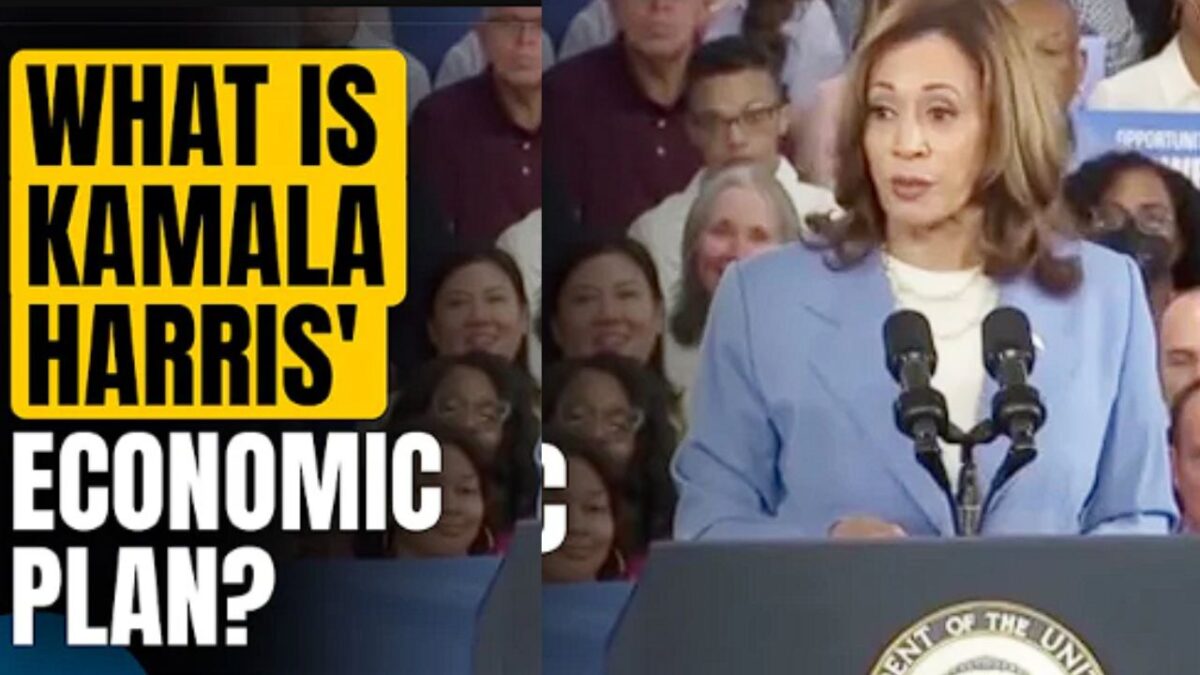Kamala Harris’ Economic Plan In a political landscape where promises of economic relief are as common as campaign slogans, Vice President Kamala Harris’ economic plan stands out for its bold promises of affordable homes and groceries. However, while these promises might sound appealing on the surface, a closer examination reveals significant flaws and potential long-term consequences that could undermine the very goals they aim to achieve.
The Promise of Affordable Home Ownership: A Closer Look Kamala Harris’ Economic Plan

Kamala Harris’ proposal for affordable housing includes a plan to provide up to $25,000 in down payment assistance for first-time homebuyers. The idea is simple: help individuals who have been responsible with their rent payments for at least two years get a foothold in the housing market. While the intention behind this proposal is commendable, the execution leaves much to be desired.
Where Will the Money Come From?
The first question that arises is the source of this funding. Harris’ plan does not provide a clear answer to how this $25,000 assistance will be financed. Without a well-defined funding mechanism, this proposal could lead to increased government debt or higher taxes, both of which could have adverse effects on the economy.
Impact on Home Prices
Moreover, by injecting a significant amount of money into the housing market, there is a real risk of driving up home prices. When a large number of buyers suddenly have access to an additional $25,000, the demand for homes will inevitably increase. However, without a corresponding increase in the supply of houses, this heightened demand could lead to inflated prices, making homeownership even less affordable in the long run.
Long-Term Consequences for the Housing Market
Beyond the immediate impact on prices, there are concerns about the long-term sustainability of such a program. If the government continues to inject money into the housing market without addressing the underlying issues of supply and demand, we could see a housing bubble similar to the one that led to the 2008 financial crisis. This could result in a market crash, leaving many homeowners underwater on their mortgages and exacerbating economic inequality.
Price Controls on Groceries: A Dangerous Precedent
Harris’ economic plan also includes a proposal to implement federal price controls on groceries to combat inflation. The rationale behind this idea is to prevent large corporations from exploiting consumers by charging excessive prices for essential goods. However, history has shown that price controls often do more harm than good.
The Real Causes of Inflation
Inflation is a complex phenomenon influenced by various factors, including monetary policy, supply chain disruptions, and shifts in consumer demand. To suggest that inflation can be controlled simply by capping prices at the grocery store overlooks these underlying causes. Moreover, the idea that corporations are primarily responsible for inflation is a simplification that ignores the broader economic context.
Consequences of Price Controls
Price controls can lead to several unintended consequences. For one, they can create shortages as suppliers are no longer willing or able to sell their products at the artificially low prices set by the government. This could result in empty shelves and long lines at grocery stores, as we have seen in other countries that have implemented similar policies.
Additionally, price controls can stifle innovation and reduce the quality of goods available to consumers. When companies are forced to sell their products at a loss, they may cut corners in production or reduce the variety of items they offer, ultimately leading to a lower standard of living for consumers.
Kamalanomics: A Flawed Vision for America’s Future
Harris’ economic proposals are rooted in a vision of a government that plays an active role in regulating markets and redistributing wealth. While this approach may appeal to some voters, it represents a significant departure from the free-market principles that have historically driven American prosperity.
Government Overreach and Economic Freedom
One of the fundamental problems with Harris’ plan is its reliance on government intervention to solve complex economic issues. By expanding the government’s role in areas like housing and grocery pricing, Harris’ proposals risk undermining the very market mechanisms that have made the U.S. economy the envy of the world.
The Case for Market-Based Solutions
Instead of turning to government intervention, we should focus on market-based solutions that empower individuals and businesses to drive economic growth. Policies that encourage entrepreneurship, reduce regulatory burdens, and promote competition are more likely to lead to sustainable economic prosperity than top-down government mandates.
Encouraging Personal Responsibility
Another key aspect of a successful economic policy is fostering a culture of personal responsibility. While it is important to provide a safety net for those in need, policies that promote dependency on government assistance can have detrimental effects on individuals’ motivation and ability to succeed. By encouraging personal responsibility and self-reliance, we can help more Americans achieve financial independence and build a brighter future for themselves and their families.
Conclusion: A Path Forward for Economic Prosperity
Kamala Harris’ economic plan, while well-intentioned, is fraught with potential pitfalls that could have serious consequences for the American economy. From the risks of inflating the housing market to the dangers of government-imposed price controls, these proposals represent a misguided approach to economic policy.
Instead of doubling down on government intervention, we should pursue policies that foster economic freedom, promote personal responsibility, and empower individuals to take control of their financial futures. By embracing market-based solutions and encouraging entrepreneurship, we can build a more prosperous and equitable society for all Americans.
